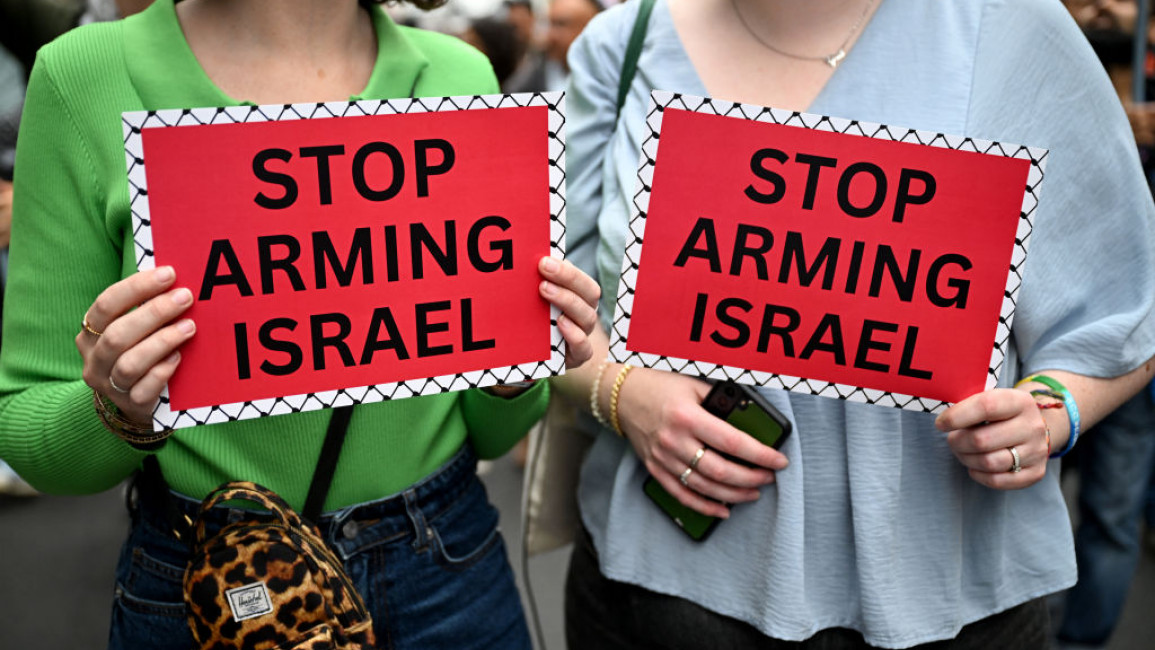
Suspending some arms export licenses to Israel isn’t enough
On Saturday July 13 Abu Hassan, a driver for ActionAid in Gaza, was in Al-Mawasi in Khan Younis where he was sheltering with his family when the Israeli military struck nearby tents, killing 90 people and injuring around 300 others. Abu Hassan survived, but it is only sheer luck that stopped him from joining the 40,000 plus slaughtered Palestinians in Gaza that day.
The area targeted by the military was a designated humanitarian zone, home to thousands of displaced Palestinians like our colleague Abu Hassan. The attack left him deeply shook: afterwards, he told us that his family would disperse and no longer shelter in the same place, so that – in his words – at least they would not all be killed at the same time. This is the kind of heartbreaking calculation our staff, partners and the women and girls we work with in Gaza are having to make every single day.
UK complicity
The Israeli military said its intended target was two senior Hamas fighters, yet it dropped three GBU-31 2000lb bombs which have a ‘lethal radius’ of 360m on a densely populated area, in what was quite possibly a serious breach of international humanitarian law.
Last week an investigation was able to definitively prove the exact aircraft used in the attack: a F-35 combat aircraft, considered to be the most lethal fighter jet in the world, and which the UK produces parts for. These components are the UK’s most significant arms supplies to the Israeli military, according to Campaign Against Arms Trade (CAAT) – so you can imagine our dismay when the government declared them exempt from the arms export license suspensions it announced last week.
The UK government revealed it would be suspending just 30 out of 350 arms export licenses to the Israeli government – less than 10%. It was a bitterly disappointing outcome for organisations like ours which have been calling for a full suspension for months.
Indeed, the government must go further. If it believes the Israeli military may be breaching international humanitarian law in Gaza, it must halt all new and existing export licenses to the Israeli government immediately. Until it does so, the UK remains at risk of being complicit in atrocities which are taking place in Gaza daily.
Death and destruction
This last week alone saw another deadly Israeli military attack on the so-called humanitarian zone of Al-Mawasi, which killed an estimated 40 people and injured 60, as well as an attack on school sheltering thousands of displaced people which killed at least 18 people, including six UN aid workers. Attacks like these on places where people should have been safe are utterly unacceptable and potentially illegal.
Israeli military attacks are devastating the lives of the women and girls we work with in Gaza. Bombs have destroyed their homes, workplaces, schools and places of worship. Thousands have been killed: women and children make up more than half the total death toll since October.
Incidents of gender-based violence have also increased: the UN reports that women and girls in Gaza, including in those in detention, have been subjected to sexual assault and violence. All incidents of sexual violence against women both in Palestine and in Israel are thoroughly investigated.
Things have to change
Under the Arms Trade Treaty, the UK is legally required to stop arms exports if there's a risk they could be used to commit gender-based violence. It also has a duty, as per the measures issued by the International Court of Justice, to ensure the Israeli military does not commit acts that could constitute genocide in Gaza – such as the killing of Palestinians. Yet on both counts, the UK is falling short.
The UK government has been demanding an immediate ceasefire and the release of the hostages for months now, without success. It's time for it to shift up a gear and apply every diplomatic lever available to secure this outcome. Crucially, it must halt all new and existing arms licenses to the Israeli government, as well as impose sanctions – such as travel bans and assets freezes – on senior Israeli officials linked to alleged breaches of international humanitarian law.
After over 11 months of horror, there is no time to waste. Every day we hear from our colleagues and partners how life for women and girls is getting worse. Gaza’s starving, exhausted and traumatised population and the hostages who have been in captivity for almost a year need a permanent ceasefire and an end to this nightmare, now.
Hannah Bond, co-CEO of ActionAid UK.
Follow her on X: @h_rbond
Have questions or comments? Email us at: editorial-english@newarab.com
Opinions expressed in this article remain those of the author and do not necessarily represent those of The New Arab, its editorial board or staff.




 Follow the Middle East's top stories in English at The New Arab on Google News
Follow the Middle East's top stories in English at The New Arab on Google News


